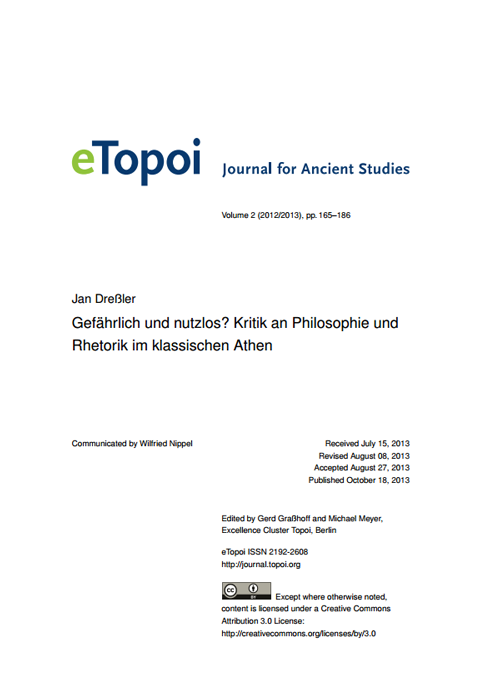Gefährlich und nutzlos? Kritik an Philosophie und Rhetorik im klassischen Athen
The arrival of philosophy and the art of rhetoric in 5th and 4th B.C. century Athens has left its mark on the city’s cultural life as well as on classical culture in general. The process was, however, accompanied by a sometimes heated discussion about the dangers the new education was expected or supposed to have for the community. This critical discussion cannot be dismissed as mere comical mockery, or be reduced to underlying political conflicts alone. In Athens, the new education’s implications for the communal life of the polis were for the first time discussed in front of a larger public. The first indepth reconstruction and analysis of this discourse has been the aim of my PhD thesis, made possible by a grant from the Excellence Cluster Topoi. This paper recapitulates its mayor results.
Die Etablierung von philosophischer und rhetorischer Bildung im Athen des 5. und 4. Jahrhunderts v. Chr. hat das kulturelle Leben der Stadt und zugleich die antike Kultur insgesamt entscheidend geprägt. Begleitet war dieser Prozess allerdings von einer zuweilen intensiv geführten kritischen Diskussion, in der die – befürchteten, unterstellten – Gefahren des neuen Bildungswesens für die Gemeinschaft thematisiert wurden. Dieser kritische Diskurs lässt sich keineswegs als Komödienspott abtun oder allein auf zugrundeliegende politische Auseinandersetzungen zurückführen: Was die neue Bildung in positivem, aber vor allem auch in negativem Sinne für das Zusammenleben in der Polis bedeutete, wurde in Athen erstmals in einer breiteren Öffentlichkeit diskutiert. Die im Rahmen des Exzellenzclusters Topoi geförderte Dissertation (deren Ergebnisse im Folgenden zusammengefasst werden) hat diesen Diskurs erstmals umfassend rekonstruiert und analysiert.

